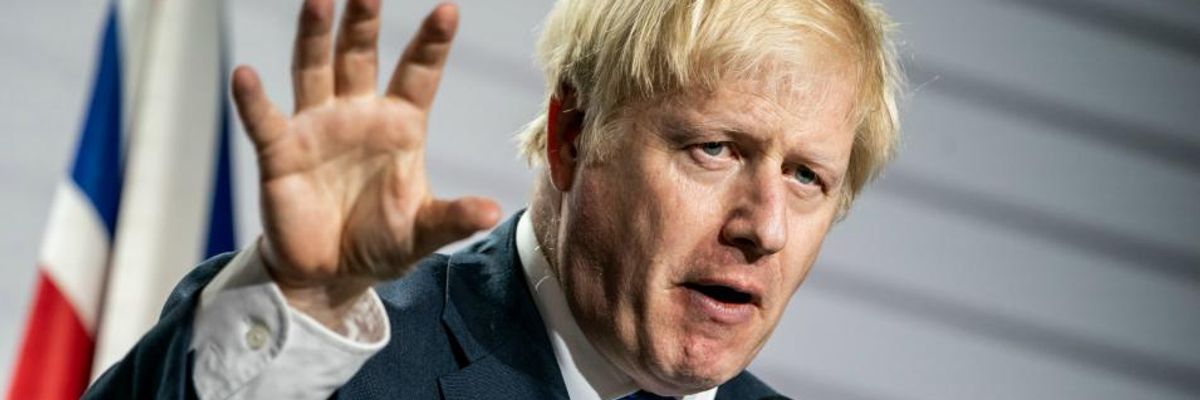
British Prime Minister Boris Johnson speaks at the closing press conference of the G7 summit in Biarritz, France. (Photo: Michael Kappeler/Picture Alliance via Getty Images)
'This Is a Coup': Warnings of Ploy to Ram Through No-Deal Brexit as Boris Johnson Moves to Suspend UK Parliament
"Boris Johnson's attempt to suspend parliament to avoid scrutiny of his plans for a reckless No Deal Brexit is an outrage and a threat to our democracy," said Labour leader Jeremy Corbyn
British Prime Minister Boris Johnson on Wednesday announced plans to suspend the U.K. Parliament, a move lawmakers and commentators condemned as a flagrant abuse of power aimed at forcing an exit from the European Union--with or without a deal.
"This is a coup d'etat, and it must be fought," tweeted Guardian columnist Owen Jones.
The New York Times described Johnson's decision, which was approved by the queen, as "a surprise maneuver that would make it harder for lawmakers to prevent Britain from exiting the European Union without an agreement with the bloc," also known as No-Deal Brexit.
"In a letter sent Wednesday to all members of Parliament, Mr. Johnson said he intended to resume on Oct. 14, with a speech by Queen Elizabeth II, laying out the agenda of the Conservative government," the Times reported. "By scheduling [the queen's speech] before the Brexit deadline, he would further limit the time available to opponents of a No Deal Brexit."
Johnson has repeatedly stated the U.K. will leave the European Union at the end of October, even if an agreement is not reached.
Labour Party leader Jeremy Corbyn called Johnson's effort to suspend Parliament an attempt "to avoid scrutiny of his plans for a reckless No Deal Brexit."
"Labour will work across Parliament to hold the government to account," Corbyn tweeted, "and prevent a disastrous No Deal."
Other British MPs, including some from Johnson's Conservative Party, joined Corbyn in denouncing the move.
House of Commons Speaker John Bercow, a Conservative MP, called Johnson's plan "a constitutional outrage," echoing the widespread response to the news.
Liberal Democrat MP Sarah Wollaston said Johnson is "behaving like a tin pot dictator."
"Time for ministers to resign and Conservative MPs to cross the floor rather than be tainted with this outrage," tweeted Wollaston.
An Urgent Message From Our Co-Founder
Dear Common Dreams reader, The U.S. is on a fast track to authoritarianism like nothing I've ever seen. Meanwhile, corporate news outlets are utterly capitulating to Trump, twisting their coverage to avoid drawing his ire while lining up to stuff cash in his pockets. That's why I believe that Common Dreams is doing the best and most consequential reporting that we've ever done. Our small but mighty team is a progressive reporting powerhouse, covering the news every day that the corporate media never will. Our mission has always been simple: To inform. To inspire. And to ignite change for the common good. Now here's the key piece that I want all our readers to understand: None of this would be possible without your financial support. That's not just some fundraising cliche. It's the absolute and literal truth. We don't accept corporate advertising and never will. We don't have a paywall because we don't think people should be blocked from critical news based on their ability to pay. Everything we do is funded by the donations of readers like you. Will you donate now to help power the nonprofit, independent reporting of Common Dreams? Thank you for being a vital member of our community. Together, we can keep independent journalism alive when it’s needed most. - Craig Brown, Co-founder |
British Prime Minister Boris Johnson on Wednesday announced plans to suspend the U.K. Parliament, a move lawmakers and commentators condemned as a flagrant abuse of power aimed at forcing an exit from the European Union--with or without a deal.
"This is a coup d'etat, and it must be fought," tweeted Guardian columnist Owen Jones.
The New York Times described Johnson's decision, which was approved by the queen, as "a surprise maneuver that would make it harder for lawmakers to prevent Britain from exiting the European Union without an agreement with the bloc," also known as No-Deal Brexit.
"In a letter sent Wednesday to all members of Parliament, Mr. Johnson said he intended to resume on Oct. 14, with a speech by Queen Elizabeth II, laying out the agenda of the Conservative government," the Times reported. "By scheduling [the queen's speech] before the Brexit deadline, he would further limit the time available to opponents of a No Deal Brexit."
Johnson has repeatedly stated the U.K. will leave the European Union at the end of October, even if an agreement is not reached.
Labour Party leader Jeremy Corbyn called Johnson's effort to suspend Parliament an attempt "to avoid scrutiny of his plans for a reckless No Deal Brexit."
"Labour will work across Parliament to hold the government to account," Corbyn tweeted, "and prevent a disastrous No Deal."
Other British MPs, including some from Johnson's Conservative Party, joined Corbyn in denouncing the move.
House of Commons Speaker John Bercow, a Conservative MP, called Johnson's plan "a constitutional outrage," echoing the widespread response to the news.
Liberal Democrat MP Sarah Wollaston said Johnson is "behaving like a tin pot dictator."
"Time for ministers to resign and Conservative MPs to cross the floor rather than be tainted with this outrage," tweeted Wollaston.
British Prime Minister Boris Johnson on Wednesday announced plans to suspend the U.K. Parliament, a move lawmakers and commentators condemned as a flagrant abuse of power aimed at forcing an exit from the European Union--with or without a deal.
"This is a coup d'etat, and it must be fought," tweeted Guardian columnist Owen Jones.
The New York Times described Johnson's decision, which was approved by the queen, as "a surprise maneuver that would make it harder for lawmakers to prevent Britain from exiting the European Union without an agreement with the bloc," also known as No-Deal Brexit.
"In a letter sent Wednesday to all members of Parliament, Mr. Johnson said he intended to resume on Oct. 14, with a speech by Queen Elizabeth II, laying out the agenda of the Conservative government," the Times reported. "By scheduling [the queen's speech] before the Brexit deadline, he would further limit the time available to opponents of a No Deal Brexit."
Johnson has repeatedly stated the U.K. will leave the European Union at the end of October, even if an agreement is not reached.
Labour Party leader Jeremy Corbyn called Johnson's effort to suspend Parliament an attempt "to avoid scrutiny of his plans for a reckless No Deal Brexit."
"Labour will work across Parliament to hold the government to account," Corbyn tweeted, "and prevent a disastrous No Deal."
Other British MPs, including some from Johnson's Conservative Party, joined Corbyn in denouncing the move.
House of Commons Speaker John Bercow, a Conservative MP, called Johnson's plan "a constitutional outrage," echoing the widespread response to the news.
Liberal Democrat MP Sarah Wollaston said Johnson is "behaving like a tin pot dictator."
"Time for ministers to resign and Conservative MPs to cross the floor rather than be tainted with this outrage," tweeted Wollaston.

